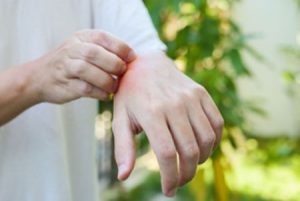 Nearly everyone has experienced an insect bite or sting at some point in his or her life. Most of the time, these stings and bites lead to mild pain or itching, right where they occurred.
Nearly everyone has experienced an insect bite or sting at some point in his or her life. Most of the time, these stings and bites lead to mild pain or itching, right where they occurred.
Sometimes, however, people can experience more severe reactions that could be caused by an allergy to the sting or bite.
When to Seek Emergency Care:
Call 911 or your local emergency number if the injured person experiences:
- Difficulty breathing;
- Swelling of the lips, eyelids, or throat;
- Dizziness, faintness, or confusion;
- Rapid heartbeat;
- Hives; or
- Nausea, cramps, or vomiting.
Take These Actions Immediately While Waiting for Medical Help:
- Ask the person if he or she is carrying an epinephrine autoinjector (EpiPen, Auvi-Q, others) to treat an allergic attack;
- If the person says he or she needs to use an autoinjector, ask whether you should help inject the medication. This is usually done by pressing the autoinjector against the person’s thigh and holding it in place for several seconds;
- Loosen tight clothing and cover the person with a blanket. Don’t give him or her anything to drink;
- If the person is vomiting, position him or her to prevent choking; and
- Begin CPR if the person shows no signs of circulation, such as breathing, coughing, or movement.
A SMALL INSECT STING…CAN BE A REALLY BIG THING!!
Download flyer: STOTW_833_Insect Sting Allergies Download Spanish flyer: STOTW_833_Insect Sting Allergies_esp

